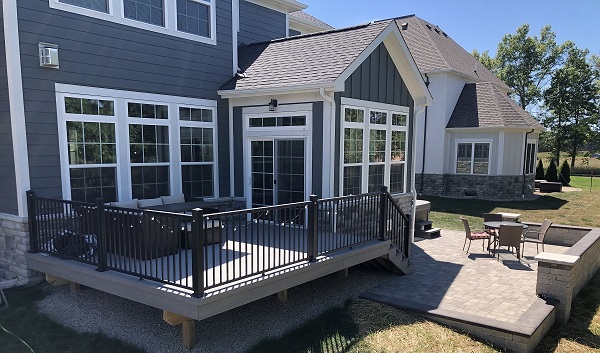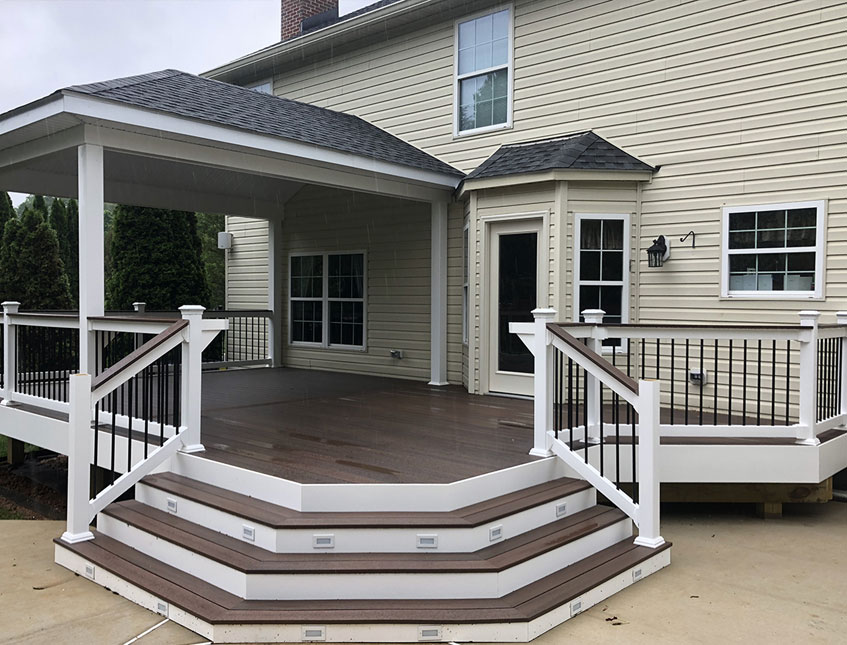Deck Inspection Requirements: What Homeowners Should Know

Table of Contents
Why Deck Inspections Are Important
Key Deck Inspection Requirements
SB326 and SB721 Deck Inspection Compliance
ConclusionA well-maintained deck will add value to the property while keeping the occupants safe. The periodic inspection of a deck prevents structural failure, saves from potential legal liabilities, and avoids expensive repairs. Owners of properties must comply with the specific requirements on deck inspections: material deterioration, proper installation of fasteners, and overall structural stability. The understanding of such requirements will enable one to have a safe and durable deck.
Why Deck Inspections Are Important
Decks are always at the mercy of the weather and can become hazardous due to wood rot, loose connections, and weak support structures. Neglecting to have your deck inspected regularly could lead to dangerous collapses or expensive emergency repairs. In states such as California, there is the SB326 inspection and the SB721 inspection, which requires periodic structural examination of multi-family residential buildings and makes sure the decks are safely compliance-ready.
Besides legal, deck inspections protect your investment by catching minor issues before they escalate into major structural ones. A good deck inspection can also be a means of assurance; it would provide peace of mind, knowing that your deck is safe for family, tenants, or customers.
Key Deck Inspection Requirements
Regarding deck safety and compliance, property owners should be concerned with the following when there is an inspection:
Structural Integrity and Load Capacity
Make sure that the deck is able to support the weight it is intended to carry without flexing or sagging.
Check for visible cracks, warping, or other signs of wear that could show structural weakness.
Joists and beams should be checked for signs of rot, insect infestation, or other forms of deterioration.
Ledger Board and Fastener Security
The ledger board must be properly secured to the main structure with lag screws or bolts since nails alone are not acceptable to carry the load.
Check all metal connectors, brackets, screws, and fasteners for rust, corrosion, or loosening.
Ensure flashing is installed to prevent water from leaking between the deck and the house, causing wood rot.
Support Posts and Footings
Check support posts for cracks, rot, or shifting that may compromise deck stability.
Check footings to ensure they are at the proper depth and made from durable, code-compliant materials.
Look for any signs of soil erosion around footings that may weaken the deck’s foundation.
Deck Surface and Material Condition
Decking boards should be looked at for cracks, splinters, or signs of rot.
Look for loose or protruding nails and screws that can cause tripping hazards.
Ensure that all the boards are securely attached and replace any damaged or weak sections.
Railings and Balusters
Make sure handrails and guardrails are secure and attach to local height and spacing requirements.
Check balusters for stability and correct spacing (typically no more than four inches apart to avoid children slipping through).
Ensure that all railings are secure and can resist pressure, showing no signs of weakness or detachment.
Flashing and Water Drainage
Ensure flashing around the connection between the deck and the building is properly installed to prevent moisture intrusion.
Look for evidence of water pooling, mold, or mildew growth that could hasten deterioration and create slipping hazards.
Allow for drainage to avoid decaying of the wood and to give the deck a longer life.
SB326 and SB721 Deck Inspection Compliance

For property owners in California, the inspection law for SB326 and SB721 set stringent deck assessment criteria for condominiums and apartment complexes. Both laws require regular inspections by licensed professionals to detect any probable hazard and non-conformity to safety measures.
Key Differences Between SB326 and SB721:
Inspection of SB326: This applies to condominium buildings that are three units or more, which must inspect their decks and balconies once every nine years.
Inspection of SB721: Applies to apartment buildings containing three or more units, necessitating structural reviews of exterior elevated elements every six years.
Inspections under both legislations need to be conducted by a licensed structural engineer or architect to confirm compliance and ensure safety.
Failure to comply with these regulations may result in fines, legal consequences, and higher repair costs later on. It is important, then, that property owners schedule timely inspections with qualified professionals.
Contact DrBalcony for a professional inspection!
Ensure the safety of your balcony and living space with DrBalcony – We’re a Tech Engineering firm that specializes in California SB326 & SB721 balcony inspections. Over 300+ completed projects in California.
Request A Free EstimateClick To CallCommon Deck Problems Discovered Through Inspections
Professional deck inspections can reveal a number of problems that are not readily apparent to property owners. Some of the most common include:
Rotting wood: Wood exposed to moisture can decay, weakening the structural elements of the deck.
Loose fasteners: Screws, nails, and bolts may become loose over time, compromising stability.
Inadequate flashing: Poorly installed or missing flashing can lead to water damage and deck deterioration.
Pest infestations: Termites and other insects can weaken wood structures, making the deck unsafe.
Improper spacing: Deck boards and railings must comply with building codes to prevent falls and accidents.
Hiring a Professional Deck Inspector
While property owners can perform basic visual inspections, only a certified deck inspector can help ensure such structures meet current building codes and safety regulations. DrBalcony specializes in professional deck and balcony inspections to ensure compliance with SB326 and SB721. Our expert inspectors provide detailed reports, highlighting the potential risks involved and recommended repairs to maintain the integrity of decks.
A professional deck inspection generally includes:
A thorough visual inspection of structural components, materials, and hardware.
Weight-carrying capacity testing to see if the deck is safe to walk on.
Moisture and decay testing to determine which areas are vulnerable.
Checks against local building codes and safety standards within the industry.
How Often Should You Schedule a Deck Inspection?
There are several factors determining how often one should inspect their deck, which include but are not limited to age, type of material, exposure to elements, and building codes. As a general guideline:
Homeowners should perform a deck inspection at least once a year, preferably before summer starts, which is considered the peak season for decks.
Multi-family and commercial properties should undergo professional inspections every three to five years, as per local requirements.
Properties subject to SB326 inspection and SB721 inspection shall follow the timelines set by these mandates to stay compliant.
Conclusion
Regular deck inspections are important for property safety, compliance, and longevity. Proper deck inspection requirements help property owners avoid structural failures and costly repairs while providing a safe environment for occupants. If you own a multi-family property in California, you must be in compliance with SB326 inspection and SB721 inspection regulations. Be proactive with regular deck and balcony inspections with DrBalcony to protect your investment and prevent safety hazards.
Not only does a properly maintained deck make your house more beautiful, but it’s also a lot safer. No matter if it is just for the regular check or compliance, the DrBalcony professionals will take over with this important inspection. Arrange for your professional deck inspection with our company!
FAQ Section: Top Questions & Answers
My property is well-maintained. Do I really need SB-326/SB-721 inspections?
YES! Even with excellent maintenance, hidden issues can develop due to construction errors, material flaws, or severe weather exposure. Inspections are about ensuring those don’t turn into major problems.
Our balconies were inspected a few years ago – isn’t that enough?
Unfortunately, no. California laws mandate inspections on a set schedule, often every 6 years. Deterioration can happen quickly, making regular assessments essential.
Can I use my regular handyman for the balcony inspection?
It’s not recommended. Unless they hold specific licenses (architect, structural engineer, etc.) their inspection won’t be considered valid for SB-326/SB-721 compliance.
What if the inspection uncovers major issues?
First, don’t panic! Early detection often means less extensive (and expensive) repairs are needed. Work with your inspector to prioritize fixes, and explore if they offer repair services for a streamlined solution.
I’m worried about the cost of inspections. Are there any resources to help?
Start by getting detailed quotes from multiple companies. Factor in that proactive inspections help you avoid even bigger costs down the line due to neglected problems. Some property management associations offer guidance on budgeting for balcony compliance.
